The Apache rode until sunset. Then they rode until sunrise. They felt the wind through their hair and the horses pounding the earth, but all they heard was *the song*.
In the beginning, they had thought Goyaate had sung the song and they had only kept pace with it. Then they opened their throats and came to believe that they too sang the song. But after many hours, when exhaustion had stripped away all illusion, they realized that the song was singing all of them, and they were carried by the magic of it, out of themselves, across the land, without hunger, thirst, or fatigue.
They came to the middle of the emptiness where the color had leached away from the grass and the wind had forgotten its name. There in the center was nothing. And in the center of nothing was No One.
No One saw Goyaate and jumped with the surprise of seeing something in the emptiness. Then he remembered being human and raised his hand in greeting. The men and the horses fell exhausted and into a deep, dreamless sleep. All but Goyaate. He approached No One and sat with him by the fire that No One did not have. Goyaate told No One of all the things that the Apache did not have. Lands of their own, horses, great herds of beef. He spoke of the loved ones who had been murdered by the white man, and the children who had not been born because there had been no mothers to bear them. He spoke of the stories that had not been told and the laughter that had not been laughed. And with each of these things that weren’t No One nodded in understanding.
And when he was done listing the things that had been taken, the things that had been lost, and the things that would never be, Goyaate named Hope and he named The Future. No One looked away, because Goyaate had listed all of the things the Apache did not have and there was only nothing left to say.
Only then in that empty place did the mighty Goyaate dare to speak of the thing he had a vision of — of peering through a hole in the nothing that led to another world. One where the white man could not follow and would never come. He said that, if it existed, then No One must surely know about it. And if there was a place for an emptiness that contained another world then surely it would be here.
No One smiled and shook his head slowly. No One knew of such a hole. He told Goyaate of the dangers of such a passage. Of how it could be like one of the lines that the white man used to catch fish from the water. A hook dangling on the end, hidden by bait, floating its way through Goyaate’s dreams. No One could know for sure that it was a trap, but he knew that such a passage across the borders between worlds couldn't be opened just from one side. Someone was calling to this world and even with greatest of visions and the strongest of magics it would be dangerous to answer.
Goyaate laughed bitterly and said, "dying there can only be as bad as dying here.
No One said nothing. Then he said one thing. From that one thing Goyaate was able to understand how the ceremony was to be performed and where and how he might find the place for such a rite.
Goyaate smiled and said, “That is strange, I…"
No One asked him to finish his sentence.
"It is easier than I thought."
"Most things are when you know how."
Goyaate nodded and turned and looked at his men and their horses, lying on the ground as if dead. No One said, “You have come a long way, you should rest." Then No One touched Goyaate on the shoulder and the emptiness rose up within him and fell into a deep sleep.
Who could say how long they slept, or if time even passed in that lack of a place. But after what seemed like a long time, the creatures rose from their slumber. Man and horse alike were amazed to find that they were not thirsty or hungry or even sore after the ride.
When several of them started wondering from where they might find something to make a fire, Goyaate said, “We should not waste this gift." Then he mounted his horse and rode on.
The next day, Goyaate’s magic deserted him. Fatigue fell on the men and horses as if all the miles they had traveled had been saved up for them until now. No man would stay stop, but in their hearts, they longed for rest. Soon they thought, one of the horses would drop dead and they would be forced to stop.
They finally came to a place they recognized. Off to the right was the Gila forest and in front of them were the Chiricahua mountains and a place called Apache Spring where most of them had once surrendered. Red Sleeve, the oldest and the worst for wear among all of them, spurred his tired horse next to Goyaate. The War Chief looked not at his men, but only had eyes for the horizon. Before Red Sleeve could speak, Goyaate said, “We will rest here until nightfall. Then we will ride on by the light of the moon. We are in the death grounds and there will be no more rest after this.
That night they entered the mountains When the way became steep, they dismounted and led the animals. The horses were sure of foot but the Apache wanted no chance of dislodging a rock and having its rattle down the mountainside, betray them to distant scouts.
Goyaate was certain that Fort Bowie knew nothing of their escape from the Fort Sill reservation. What scout could ride faster than they had ridden, hypnotized by the sacred trance of War? But he was mistaken. The telegraph was faster than any trance.
At first light, they were spotted by scouts from the garrison at Fort Bowie. They heard a bugle echoing throughout the mountains and knew that the fight was coming to them. Now they made brave noises, speaking boastful words they hoped would distract them from fear.
Among the chatter, Red Sleeve spoke the truth of his heart to Goaayte. “I do not want to be twice defeated in the same place." Goyaate looked up sharply as one whose mind was far away, thinking of something else. He shook his head and said, “We will not be defeated. Our place is further on. You will see."
And they rode on.
Goyaate put out no scouts and made no effort to hide their tracks in the Apache way. He just rode. This time there was no song. No surge of hope and possibility. They rode through the mountains driven by the threat of the cavalry behind them.
A dark muttering went through the men. Perhaps Goyaate had spent the last of his power back on the plain and now they followed an old man to their deaths.
It did not matter. There was nowhere else to go. The trail they were on took but one path through the mountains. A few young strong Braves might climb the cliffs here, hold off the army with rifles for hours, maybe days in this narrow pass. But they had no young strong Braves anymore.
They came out from the cliffs. And in front of them opened up all of the Arizona territory. From this height, it seemed that they could see all the way to Mexico. There was nowhere to run. And nowhere to hide.
"We should turn and fight," said one of the men more from fear than from thirst for blood.
"This would be a stupid death," muttered another.
Red Sleeve said, “What say you War Chief?"
But Goyaate did not answer.
"We should fight them in the narrow place, back there, better odds that way,” said Red Sleeve.
A pistol shot sounded from the right. There, a scout, atop the ridge. The scout fired his pistol into the air again and again in excitement. He could see the outcome. Any man could see they had nowhere to run. All eyes turned to Goyaate. What was the great War Chief’s plan? He opened his mouth, and all were eager for the order, but what came out was a noise that was so like a sob, no one knew what to do. Was the War Chief crying?
The sound from Goyaate’s throat did not stop. He sang it on the exhale and he sang it on the inhale. The men all looked to Red Sleeve and he moved to speak to Goyaate once again. To tell him what they all felt in their hearts. That this death would be enough. Here would trap the cavalry in the pass. Here they would sell their lives dearly. He opened his mouth to tell his old friend that this was a good day to die.
But when he came up beside the War Chief he saw that the man’s eyes were rolled back into his head and nothing showed but the whites. Goyaate’s chant grew louder and louder. It grew from a sob into an angry cry.
The hair stood up on Red Sleeve’s arms and he felt a hot wind come up from the valley. The light turned blood red. He heard a growling, roaring, splitting noise as if the earth itself was cracking open but somehow the sound was coming from Goyaate. He heard the cries of the men behind and turned to see the cavalry, galloping out of the pass, drawing sabers. A bugler sounded the charge.
But the Apache were not looking back at the cavalry. They were looking down in the valley. He saw a shadow fall across the faces of the Apache and turned to see a wall of sand as tall as the sky hurtling towards them.
Goyaate, come back at last, cried “Ride, RIDE!” And he spurred his horse down the slope and into the oncoming dust storm. With a war cry, Red Sleeve followed.
They should have died. They should have died many times before this mad ride out of the mountains, but for certain they should have died racing blind down that hill into the dying sun and the devouring storm.
After a time, the hill Red Sleeve could not see beneath him became the plain he could not see beneath him and the panic of his horse became a walk. The sun set and the wind died, but the dust hung in the sky, suspended now in the still, desert air. Red Sleeve saw no one. He was all alone in the darkness.
He heard a faint drumbeat, far off. Then saw a flash of light, diffused by the dust. Having no other landmark, he aimed his lathered, exhausted horse towards it. Then another beat, louder, followed by another flash. The drumbeat became a regular pulse. He was so lost and exhausted that he cared not that everyone on the plain, friend or foe, would head to the same place.
But surely the cavalry would not have followed them into such madness? Red Sleeve wondered if anyone else was still alive.
Boom. Boom. Boom.
As he drew closer, the frequency of the drum increased and the light became more brilliant. He came to a flat place with a large saguaro after one side. He saw shadowy figures each revealed as a patch of darkness against the light. From the way they squatted, he could see that they were Apache. In the center of them, a man was striking the ground with his palm, raising his hand high and dropping it to the earth again and again. Each time he hit the ground with greater force than the last. And when he struck the ground a brilliant blue light exploded outward.
Red Sleeve got off his horse and led it towards the circle of men.
Goyaate raised his voice in a cry, not missing a beat as he pounded the earth. His voice came as if he were all around them and was a cry such as Red Sleeve had never heard before. And when the War Chief brought his hand down the next time, the blue light became everything. They left and took the desert with them.
For the first mile, Archie kept looking over his shoulder to check the connections between the two wagons. After a particularly rough jolt, he handed the reins to Jane and climbed back to inspect his handiwork. But that which Archie had joined, it seems no bump would put asunder.
Cantering along behind the unruly two-wagon rig, MacAllister said, "as much as it pains me to say it, I dinna think your cinch will fail.”
The rugged and forbidding landscape took on a magical aspect in the moonlight, and the yapping and howling of coyotes in the distance gave the journey a peaceful air.
After a time Jane said softly, "I don't care what you say, Mr. Croryton. I believe you are a prince."
Archie laughed out loud.
"See, you are," said Jane.
"I most certainly am not," said Archie.
“Well maybe. I mean if you were a prince, then you wouldn't be so ignoble as to take money away from the commoners like MacAllister and me."
"I dare say that is because you have had no experience with royalty. Where do you think all these riches come from? From the labor of peasants, my dear." He gave her a friendly poke when he said the word "peasants."
Jane's face warped into a scowl that made Archie grateful she did not have a bullwhip close to hand. She said, "that is why this new nation has dispensed with kings and princes and such wickedness has that. We have no parasites here."
"That is just a strength of youth, Miss Siskin. Give it enough time and your ideal will become just as corrupt as anyone else’s. But were I a prince, traveling incognito, I would trust you with my secret before anyone else."
Jane smiled and they rode on, listening to the clanking of the wagon. Then Jane leaned over and whispered, "I knew it."
They brought the contraption through the dry wash with less trouble than Archie expected. It made the passage so well that he even thought of designing a six-wheeled wagon, with three independent segments, for rugged terrain. As they pulled into the yard with the rest of the freight, Archie heard drunken snoring but saw no people. Then he realized that the Teamsters were sleeping beneath their wagons the same as they had on the road.
MacAllister handed over the reins to Archie's horse and a purse of coin, muttering something about “fair and square.” Then he headed off to his own bedroll.
He had wisdom enough not to interfere with whatever romance or disaster was brewing between his boss and her client. And, on that account, he wasn't sure who he'd be saving from whom.
Archie walked Jane to her room in the Morning Star hotel, which thankfully, was a separate building from the saloon, where the piano music and the party was still going strong.
Jane turned outside her door and said, “You should treat me with respect. You might not be a Prince, but they call me the Mule Queen. Not to my face, but still.”
"Oh, indeed, Boudicca of the West."
"Who is that?"
"A Pictish queen who fought the Romans,” Archie said with a smile. “and almost won.”
Jane leaned in and kissed him, long and hard. And when she pulled back she said, “A prince. I knew it. And don’t forget… I outrank you.”
Then she closed the door without saying goodnight.
Virgil let his horses follow the road to Grantham at a walk as he nodded off in the wagon seat. At first, he was glad of not staying in Bisbee, but as the sun went down and the moon had risen, he questioned the wisdom of his choice. He was tired, bone-tired, and between himself, the horses, and the moonlit road he had to admit he wasn't as young as he used to be.
How many years had it been since he fired a gun? Or even thought of killing a man, let alone… It wasn't a pang of conscience – not exactly – but a fear that the old days had come again. A fear that the old days were all there was and his time with Laura and the children had been the exception a lull in the storm of his life.
It was fear that the truth of things was war, bloodshed, stupidity, and struggle. That love counted for nothing in the face of might. That every man’s strength faded sooner or later, removing the possibility of defeating one's enemies and leaving, only the question of how bravely one might face the end.
What he had done to those Chiracahua today – they had deserved it, surely — and he had done it save lives, but it wasn't a thing that he ever wanted his son Mack to know how to do. But maybe Mack needed to know. As he jolted along with the ruts in the road, Virgil came to grips with the fact that he would not always be there to protect his family, and perhaps he had not done enough to prepare them.
And if he did not prepare them, who would protect him in his old age?
He had planned on stopping at the swing station and sleeping where he could find a place, maybe under the wagon. But his thoughts gave him such urgency that in the early morning hours he found himself getting a second wind. He did not drive the horses as much as he could. It has been a long day for them as well and they were good horses that deserved better than this treatment. So he rolled along, an old man in his wagon full of goods.
He came down into the open valley and did not look closely at the bodies of the dead men and horses. In the moonlight even not looking revealed that the buzzards had been at them. When he had passed he had to fight the foolish urge to look back and make sure that the men he had killed were not rising from the ground and following him in pursuit of vengeance. It was foolishness whispered to scare children. If such things existed, he would've seen them during the war, in Kansas, or in the terrible aftermath of Chickamauga.
After Chickamauga, he had awakened in a pile of bodies, suffocating. He had to fight his way through the dead to return to the world of the living. When he returned to his unit, some days later, he found out that it had been decided — although he knew not how it could be — that the Confederacy had won a great victory. Virgil decided that if that was victory, then the war between the states wasn't worth winning. He deserted and vowed to leave violence behind him. Yes, here he was, all these years later, vowing the very same thing. In the end, perhaps the end of violence was death and he wasn't ready for that yet.
Two miles outside Grantham he saw a flash of blue light in the sky. At first, he thought it might be lightning, but there had been no thunder. Then he saw it again and a boom followed with it. He wondered if the dry wash might have water in it by the time he got to town.
Then the blue light filled the sky to the northeast with an eerie glow that rose in intensity, making a mockery of the night. He heard thunder roaring so loud it was as if Giants were shouting in a language he did not understand.
Then, like the surf after the breaking of a wave, the light crested and pulled back in upon itself, wrapping the world in silence and darkness once again.
There was a cool, moist wind filled with strange smells. And then nothing.
For a time he drove the wagon on through darkness mad darker from this interlude of light. The moon started to dip below the horizon behind him, but before it disappeared completely it was overpowered by the dawn. The sun blinded him as he came over the rise and down the hill to the wash on the west side of town. He tried for a glimpse of home through the brilliant sun but found he couldn’t squint enough against the light to see anything other than the road in front of him.
It was only when he came up out of the wash that he realized the town was gone. No road. No buildings, not even the dirt was the same.
He jumped off the wagon and felt the strange, tubular grass crunch beneath his feet. He left the horses to graze on this strange prairie and stumbled towards the sun. There was the hill of the Morning Star Mine, but no mine. The slope was covered in this same strange grass. Where DuMont’s pink house had been, there were now trees unlike any he had seen before; long, spindly trunks ending in balls of leafy green. And where his store had been there was nothing but the strange grass and the bitter smell it release as he crushed it beneath his boot heels.
He turned once, calling out, “Hello!” There was no answer. Somehow, they were all gone.
That’s the end of Part One of A Town Called Nowhere. The story will continue on March 11th.


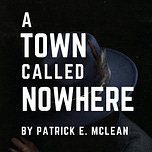



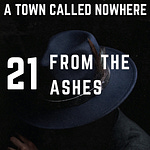
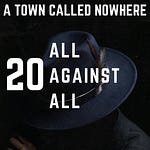
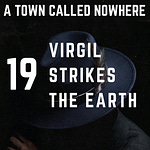


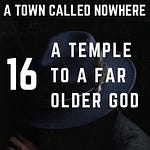

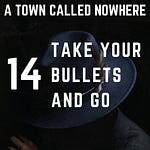
Share this post